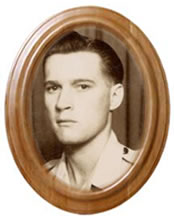
Return To Veterans Accounts Index
Cooking For The Royal Berk’s Wasn’t
Always Fun!
by
Sgt. Bertram King 14254119
Page 3
The cook’s course
was quite useful because we learnt how to make cookers; we used to cook on
oil and water, because time was quite short.
.....In Mesopotamia in the First World War the oil and water cookery was quite
something, and what it amounts to was, a ‘Kettle trench, it’s a
trench you dug, and you put all your dixey’s, that’s the oval tubs
on, and then you put your fire underneath, and cook on that, you had the breakfast
going and everything like that, and you cook the eggs, bacon, and everything
like that, all out in the field.
.....You had the oil and water, you had two cans, one with oil in and one with
oil in, oil was sump oil or any redundant oil, or kerosene, or whatever you
could get hold of, and then you had like a tent peg, or an angle-iron, you
connected that up to the front of the two tubs of oil and water and then on
top of it you put some corrugated iron or some ammunition boxes, so you had
like a combustion chamber, and what happened is, when you lit the fire up,
so you’ve got a control unit on each tin, to control the flow of the
oil and water mix, and you had like a combustion cap, a piece of tin at the
bottom where the oil was running, and as soon as that the water hit the oil,
it combusts, so that’s how the oil and water cooker worked.
The Q.M. came to me, Montague Sumray said, ‘were moving out tomorrow
morning, won’t breakfast at 4 o’clock’, and were picking
up at the railway at Deolali, were going right across the Sin desert and across
country to Calcutta at Calcutta. We picked up another train, but we were stopping
at railway stations along the route, making tea with the hot water from the
railway engines boiler. They had a railway system there that you’ve not
seen the like’s of. We made the dinners and everything on the train,
cooking on open gas cookers, which burned Kerosene, bloody choked them all,
I could only put a soldier in there for ten minutes at a time.
.....We went up there and picked up this first boat on the Brahmaputra River,
and that took us up to Dimapur, which was the railway head for Assam. Of course
then we were going up to Kohima after that. The boat I went up the Brahmaputra,
the engine was made in Plenty’s at Newbury, Captain Bengali, who was
the captain, and there were Lascar seamen on it. Because the Brahmaputra River
is a bloody great river, its enormous, beautiful, all the scenery we went through
was like that, I lapped it up.
.....I went down into the ships hold, and it was
quite interesting that I managed to find a cooker down there like a grey, black
stove, and I cooked pastries and all sorts on that.
Wherever we were, we took an oven with us wherever we went, I got a big fifty-gallon
drum and that was propped up on its side, and we got all our rations done up
on that. Then I’d have to make a ration scale, now I’ve got the
ration scale written out for you. (See Veterans stories: Ration Scale per Man.)
Right in the middle of everything, we were put into the Malabar jungle. Now
if you look at the map of India, you see on the left-hand-side, there’s
the Western Ghats, which are the mountains, then you’ve got Coimbatore.
Well it was the thickest jungle they had in India at the time, so they put
us down there, and that’s where the saga of the jungle greens started,
with the war we were embracing, but didn’t want.
P 1 :: P
2 :: P 3 :: P
4 :: P 5 :: P
6 :: P 7

Sgt. Bertram King
